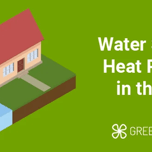Answer these simple questions and we will find you the BEST prices
Which type of solar quotes do you need?
It only takes 30 seconds
100% free with no obligation

Get up to 4 quotes by filling in only 1 quick form

Install a heat pump for less with the BUS grant

We’ve helped over 500,000 homeowners reduce their carbon footprint
- GreenMatch
- Ground Source Heat Pumps
Ground Source Heat Pumps in the UK: A Complete Guide (2026)

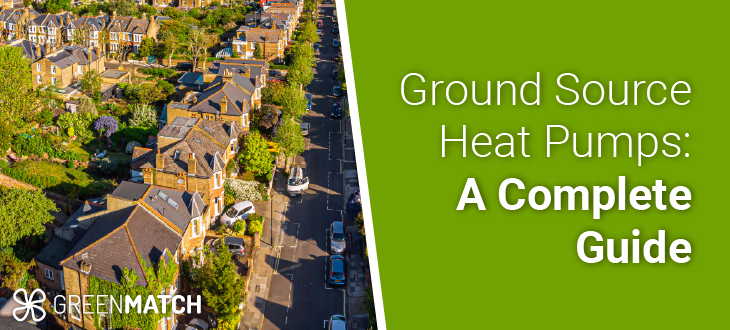
As their name indicates, ground source heat pumps transfer heat from the ground. Ground source heat pumps are a low-carbon heating alternative to traditional heating systems. Not only do they help you reduce your carbon footprint, but the heat pump vs gas boiler running costs are lower, meaning that you'll also be able to save on your yearly energy bills.
Ground source heat pumps are expected to only become more favourable for homeowners in the foreseeable future with the recent introduction of the Heat and Buildings Strategy and the UK Government’s slashing of VAT on energy efficiency measures to 0%.
In this article, we have prepared a complete guide on everything there is to know about ground source heat pumps, their purchasing and running costs, installation tips, and much more.
When it comes to a ground source or air source heat pump installation or heat pumps for apartments, finding installers you can trust who will offer fair and accurate quotes, can take considerable time and effort.
GreenMatch can save you hours of your time and money by allowing you to compare quotes directly from licensed installers in our network, all of them vetted by us.
All you have to do is fill in some details using our quick and easy form and within 48 hours, you’ll hear from up to 4 local heat pump installers. Click the button below to get started.
- Quotes from local engineers
- Payment by finance available
- Save £7,500 with BUS grant
It only takes 30 seconds



- What is a ground source heat pump?
- Price of ground source heat pumps
- Does the government provide grants for ground source heat pumps?
- Types of ground source heat pumps
- Advantages and disadvantages of ground source heat pumps
- Ground source heat pump efficiency
- Is my home right for ground source heating?
- Should I get a heat pump for my home?
- Frequently asked questions
What is a ground source heat pump?
A ground source heat pump functions by absorbing heat from the ground and transferring it to your home for space and water heating. It operates similarly to other heat pumps and geothermal heat pump systems. The stable underground temperatures (around 8-11°C in the UK) allow for consistent heat extraction.
How does a ground source heat pump work?
We’ve listed the main components of a ground source heat pump:
- Heat pump unit
- Underground heat exchanger
- Pipes (e.g. ground loops)
- The distribution system (e.g. radiators, underfloor heating, hot water)
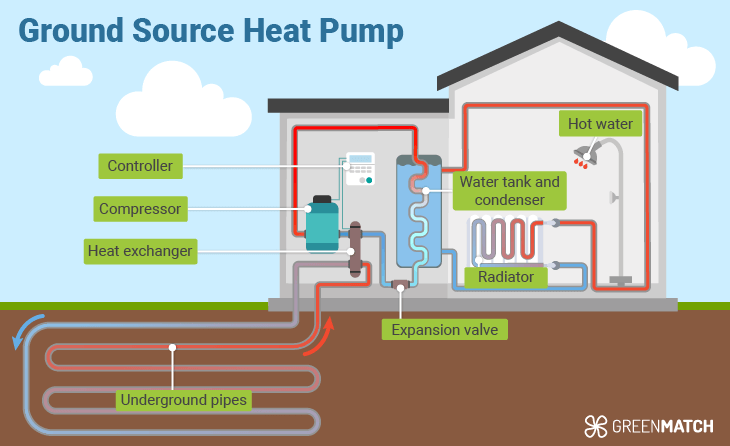
The first step is the excavation of the loop fields. To install a vertical ground source heat pump, the loop is placed in the drilled well that is dug deep from 50m to 150m in the ground.
The piping system can be configured differently depending on the amount of land available and the geological conditions. For horizontal installation, a large area of land is dug up so that the loops can be placed on the land without having to dig deep into the earth.
The heat exchanger is then installed in order to capture the heat from the ground. Then a mixture of water and antifreeze is pumped into the ground via the heat pump, and the antifreeze mixture is continuously warmed up by the constant temperature of the ground.
The liquid is fed into a heat exchanger and energy absorbed from the ground is transferred to a refrigerant, which boils at a low temperature until it turns into a gas.
The gas is fed into a compressor and the compression process makes the temperature of the gas rise.
This is then fed to a condenser, where it is distributed to the wet central heating system of the house, such as radiators, showers, faucets, and underfloor heating.
Price of ground source heat pumps
Some of the best ground source heat pumps can cost between £11,500 and £27,500 to install. The price of a ground source heat pump depends on several factors that change depending on your home:
- Type and size of ground source heat pump
- Combined with radiators or an underfloor heating system
- Installation complexity
- Labour cost
There is also a significant difference in groundwork costs between horizontal and vertical systems. Although the horizontal installation is cheaper it requires, on average, anywhere between 600m2 to 1200m2 of clear land.
| Size of heat pump | Average Heat Pump and Installation Cost | Horizontal Cost | Vertical Cost |
|---|---|---|---|
| 3-6kW | £11,500-£15,000 | £14,000 | £16,000 |
| 8-12kW | £20,000-£24,000 | £20,500 | £27,000 |
| 16kW | £27,500 | £28,000 | £37,000 |
The costs depend on each individual case and numbers do not represent actual offers. They are merely for general reference.
The price of a ground source heat pump is typically higher than both water source and air source heat pumps (including split system heat pump) due to the complexity of installation and the equipment required.
How much money can you save with a ground source heat pump?
The upfront costs of ground source heat pumps are higher than other systems, but the difference is usually compensated by energy savings and higher efficiency.
The following table is based on figures from the Energy Saving Trust, outlining the carbon dioxide and energy bill savings when using a ground source heat pump under the current energy price cap.
| Existing system | Fuel bill savings (£/year) | Carbon dioxide savings (kg CO2/year) |
|---|---|---|
| Older gas boiler (non-condensing) | £550 | 4,500kg |
| Newer gas boiler (condensing) | £90 | 3,000kg |
| Electric storage heater | £1,200 – £2,000 | 4,500kg – 5,000kg |
| Older oil boilers (non-condensing) | £600 | 7,000kg |
| LPG boiler | £500 – £1,100 | 5,500kg – 5,000kg |
| Coal | £1,300 | 12,000kg |
Does the government provide grants for ground source heat pumps?
There are several heat pump grants available that can help cover upfront costs.
- The Boiler Upgrade Scheme, a £450 million initiative under the Heat and Buildings Strategy, offers £7,500 off supply and installation in England and Wales. This took the place of the Renewable Heating Incentive (RHI) in 2022.
- Energy Company Obligation 4 (ECO4) may cover up to 100% of the costs for eligible homeowners switching to renewable heating.
- In Scotland, the Home Energy Scotland Loan provides up to £17,500 interest-free for sustainable measures installation. Additionally, installing energy-saving materials qualifies for a reduction in VAT, with further potential reductions for those over 60 or receiving income or disability benefits.
These systems not only lower energy bills but also contribute to the UK's Net Zero Target by 2050.
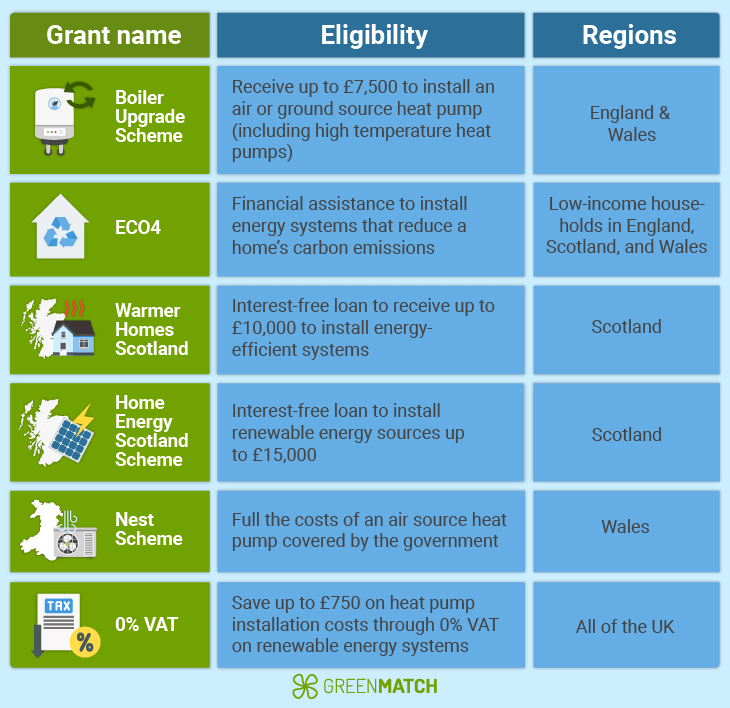
Costs vary depending on factors like home size and location, underscoring the importance of a qualified local ground source heating installer. Contacting multiple installers ensures familiarity with local regulations and suppliers, potentially leading to more competitive pricing.
Comparing quotes from different installers guarantees the best deal, ensuring you're not overcharged. GreenMatch offers access to a network of qualified installers, providing competitive quotes within 48 hours, making the process effortless. Click the button below to start comparing and choose the best price.
- Quotes from local engineers
- Payment by finance available
- Save £7,500 with BUS grant
It only takes 30 seconds



Types of ground source heat pumps
One way to identify some of the best ground source heat pumps is by the type of loop system they use. There are two different types of loop systems:
- The open loop system extracts clean groundwater to directly pass through a heat pump where heat is extracted.
- The closed loop system draws the heat from the ground itself and uses a continuous loop of piping connected to the indoor heat pump.
While an open loop system is cheaper to install, it requires access to groundwater. Whereas, closed loop systems tend to be more reliable, require less maintenance, and are extremely efficient due to extracting heat from the earth.
Closed loop vertical ground source heat pump
These are used when space is limited, often in suburban areas. Geothermal boreholes are dug at least 6m deep, with piping extending 50-150m into the ground, depending on soil composition and heating needs.
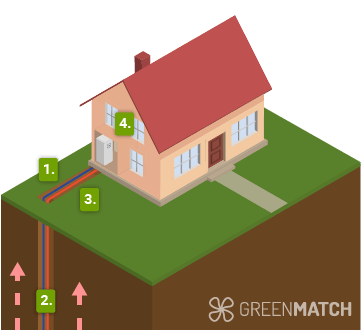
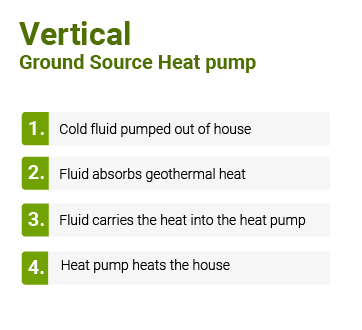
Closed loop horizontal ground source heat pump
Ideal for rural areas with ample land, horizontal systems are laid in trenches 1-2m deep. The average 150 m2 home needs an area of between 300 and 700 m2. It is more common in rural areas where there is more land available. The required area varies based on home size, depth of burial, soil properties, climate, and heat pump efficiency.
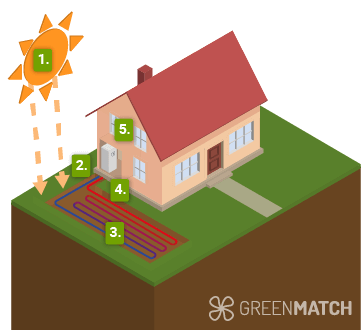
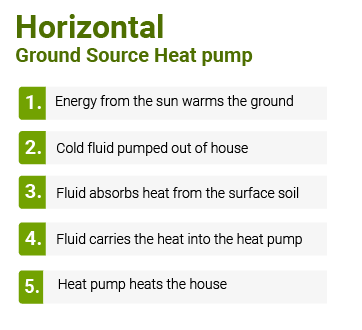
Other types of closed loop systems
Closed loop system for pond/lake
- Although less common than horizontal or vertical systems, a closed pond loop is also an option. It is uncommon because it requires proximity to a body of water, so an open loop system is usually preferable as it takes from groundwater instead. However, a closed loop system may be advantageous when poor water quality prevents the use of an open loop.
Direct expansion (DX)
- This system relies on a cyclical process when the refrigerant changes its position back and forth between a gas and a liquid. When the refrigerator absorbs the heat, the compressors start pulling the vapour from suction lines and the process is launched.
Indirect expansion
- This system is commonly used in freezer applications with carbon dioxide when changing secondary working media. In other words, during antifreeze solution/water circulation, the energy is relocated from or to the refrigerant circuit through ground heat exchange pipework.
Advantages and disadvantages of ground source heat pumps
Ground source heat pumps are a promising technology that can help reduce our reliance on fossil fuels, lower our carbon footprint and offer us many other heat pump advantages. But before you install one in your home or business, it’s important to understand both the advantages and disadvantages of ground source heat pumps.
In this section, we’ll list the pros and cons of ground source heat pumps so you can make an informed decision.
- One of the most energy-efficient systems for heating and cooling
- Save up to £90 – £2,000 a year on your heating bill when replacing an old electric system.
- Low environmental impact
- Low heat pump noise levels (around 40 – 42dB)
- Longer lifespan of components compared to air source heat pumps.
- Eligible for grants.
- Long product lifespan. Inside components last approximately 25 years, while the ground loop system exceeds 50 years (sometimes reaching up to 80 years).
- Equal distribution of heat throughout your home.
- Constant performance throughout the year.
- High up-front costs.
- Efficiency depends on soil/bedrock
- Large space requirement for horizontal systems.
- Installation makes them ideal for new-builds, not retrofits.
- Refrigerant liquid used to transfer heat could be more environmentally friendly.
Ground source heat pump efficiency
Ground source heat pump systems save energy by using the constant ground temperature, sourced from solar energy absorbed by groundwater, to enhance seasonal heating efficiency.
So, if you're wondering: "How does a heat pump work in winter?" you'll be glad to know that cold weather minimally impacts ground source heat pump efficiency, especially with vertical systems. This is because soil temperatures remain stable below 1 meter, staying at around 5 to 15°C year round.
Soil type influences efficiency, varying across regions in the UK. Therefore, to get an accurate estimation of efficiency, it’s important to get your property assessed by a professional.
Ground source heat pumps typically have efficiencies ranging from 300% to 400%, with a coefficient of performance (COP) averaging between 3.5 and 4.5.
| Heat pump system | Average efficiency |
|---|---|
| Ground source heat pump | 3.5 - 4.5 |
| Air to water heat pump | 2.5 - 3.5 |
| Air to air heat pump | 2 - 3 |
The COP indicates instantaneous performance, calculated by dividing useful heat output by electrical energy input. For instance, a COP of 4 means the pump produces 4 kilowatts of heat for every kilowatt of electricity consumed.
The seasonal coefficient of performance (SCOP) offers an average efficiency over the year, providing a more accurate measure of performance. Checking the SCOP is recommended for a thorough assessment of efficiency.
Is my home right for ground source heating?
House size and building requirements will determine whether a vertical or horizontal loop system is needed. Below we've compiled a list of criteria to consider which type of system might be best for your home.
Here are some key considerations that can help determine whether a ground source heat pump is right for your home.
- How much outdoor space do you have?
Horizontal systems demand considerable space, typically between 600m² to 1200m², with trenches at least 100m long for the collector array. Circular loops ("slinkies") may be used to save space but could slightly reduce efficiency.
Vertical systems require less surface area. An 8kW system generally needs three boreholes, each between 70m to 120m deep, depending on soil type and system size.
- Is your home well insulated?
Well-insulated homes minimise heat loss, ensuring efficient use of generated heat and maintaining consistent indoor temperatures.
Proper insulation leads to lower energy bills and reduced carbon emissions. Addressing insulation issues before installing a heat pump maximizes its benefits and enhances home sustainability.
- How big is your house?
The larger your home, the more powerful your ground source heat pump will need to be. Domestic ground source heat pumps typically go up to 16kW, which is more than powerful enough to supply heating and hot water to homes with 6+ bedrooms.
Ground source heat pumps are impractical for flats and apartments due to limited outdoor space, whereas larger houses, such as bungalows, terraced, and detached properties, can accommodate them if outdoor space allows.
- Do you need planning permission?
In most cases, ground source heat pump installations are considered permitted development and do not require special permissions.
However, special permissions are needed in Wales and Northern Ireland, and requirements vary in England and Scotland based on location and property size.
Planning permission is necessary for multiple installations, listed buildings, or properties in conservation areas. Local installers can provide guidance on area-specific regulations.

Should I get a heat pump for my home?
Ground source heat pumps offer significant energy savings and environmental benefits. So a heat pump for a boiler switch can help the average UK household save up to £550 on heating bills annually when compared to conventional, gas-fired heating systems. Initial investments are high, but ground source heat pump prices vary depending on the project and the household specifications.
While initial costs vary based on project and household specifications, they can be unfeasible for some. In such cases, hybrid heat pumps offer a solution by combining a ground source heat pump with another heating system, typically a gas or oil boiler. This allows for the installation of a smaller, more affordable ground source heat pump.
For homes needing high temperatures, high temperature heat pumps are available, providing efficient ground source heating without excessive insulation requirements.
Various brands offer ground source heat pumps in the UK market, including Vaillant, Viessmann, Nibe, Kensa, and Worcester-Bosch. It's essential to compare supplier quotes and reviews to ensure you choose the most competitive price and suitable system for your needs.
To secure fair and accurate heat pump installation quotes, thorough planning and research are essential. Avoid potential overpayment by steering clear of nationwide companies and instead, simplify the process with GreenMatch. Our service connects you directly with up to 4 licensed local installers, saving you time and effort.
Fill out our quick form, and our team will match you with the best heat pump installers. Comparing multiple local quotes ensures the most cost-effective solution. With several quotes at your disposal, you can make an informed decision and secure the best deal. Click below to get started.
- Quotes from local engineers
- Payment by finance available
- Save £7,500 with BUS grant
It only takes 30 seconds



Frequently asked questions
Ground source heat pumps offer significant long-term benefits. Switching from another electric heating system to a ground source heat pump can save £1,200 – £2,000 annually on heating bills. They typically last around 25 years and maintain consistent efficiency rates throughout the year, unlike air source heat pumps.
For horizontal ground source heat pumps, a home with 150 m2 would need an outdoor area between 300 and 700 m2. For homes without the necessary space, then ground source heat pumps can also be vertically installed. A hole is dug at least 6m into the ground for insulation and the total piping will be 50-150 m deep depending on the composition of the ground and the heat requirement of your home.
Ground source heat pumps work well with central heating radiators and underfloor heating. An underfloor heating system performs better than radiators because the heat is transferred equally across the whole surface, whereas radiators need to spread the heat from one corner to the entire room. However, due to the higher cost of underfloor heating, radiators are also a good choice that results in high performance.
If your home has a high energy efficiency rating and you qualify for a grant, then a ground source heat pump (GSHP) can very well be worth it. If you’re switching from a gas boiler, then a ground source heat pump will significantly reduce your home’s carbon footprint. A GSHP also benefits from having 300% – 400% efficiency (gas boilers have an efficiency of 94% on average).
A ground source heat pump (GSHP) is a type of heat pump that uses the heat from the ground to provide heating and domestic hot water to your home. There are different types of heat pumps to suit different-sized homes. Ground source heat pumps are most known for having a very high efficiency (300% – 400%) and being able to work all year round.

As a writer with a deep understanding of low-carbon energy systems, Hannah aims to breakdown knowledge barriers and share insights to empower individuals in their pursuit of creating more environmentally conscious homes.

We strive to connect our customers with the right product and supplier. Would you like to be part of GreenMatch?

- Ground Source Heat Pumps: A Complete Guide
- What is a ground source heat pump?
- Price of ground source heat pumps
- Does the government provide grants for ground source heat pumps?
- Types of ground source heat pumps
- Advantages and disadvantages of ground source heat pumps
- Ground source heat pump efficiency
- Is my home right for ground source heating?
- Should I get a heat pump for my home?
- Frequently asked questions
- Quotes from local engineers
- Payment by finance available
- Save £7,500 with BUS grant
It only takes 30 seconds





